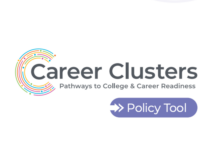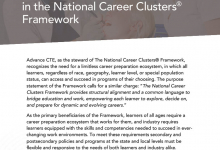Real-time and traditional labor market information (LMI) should inform all facets of the state Career Technical Education (CTE) policymaking process. Subsequently, national LMI was the foundation of the process to update the modernized National Career Clusters® Framework. Intentionality when incorporating elements of LMI into supported CTE policies and processes at both the state and local levels can help strengthen existing programs. It can also establish high-quality learner-centered career pathways aligned with postsecondary opportunity and workforce need.
This brief articulates the possibilities and innovations of using the modernized Framework to maximize incorporation of LMI into CTE and career pathway systems, including data collection and reporting, funding, and key decision making processes. Ensuring that systems and program structure and design is reflective of the employment opportunities that will exist upon a learner’s exit from the education system is crucial to the economic success of both individuals and industry.
The resource shares:
- optimal state for this policy area
- promising state practices
- key questions for consideration; and
- recommendations
This resource is part of a collection of briefs that provide recommendations, models, and promising practices to maximize the implementation of the Framework.
___________________________________________________
This resource, developed by Advance CTE, supports the adoption and implementation of the National Career Clusters® Framework. The Framework serves as the central building block to achieve consistently designed and high-quality Career Technical Education (CTE) programs. First introduced in 2002, a version of the Framework is used by the majority of states with Advance CTE as its steward. A modernized Framework was unveiled in October 2024 after a 2-year development and validation process.
Visit the Career Clusters section of the Advance CTE website for additional information about the full Framework and all associated tools and resources.






